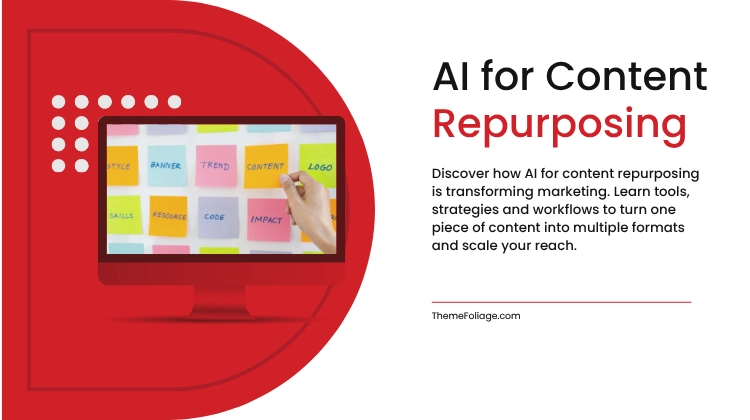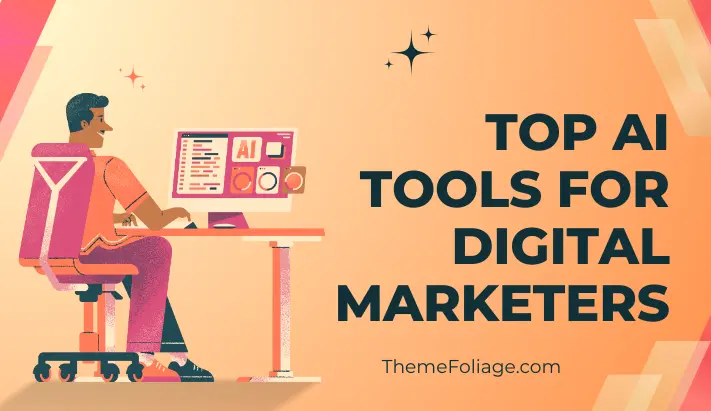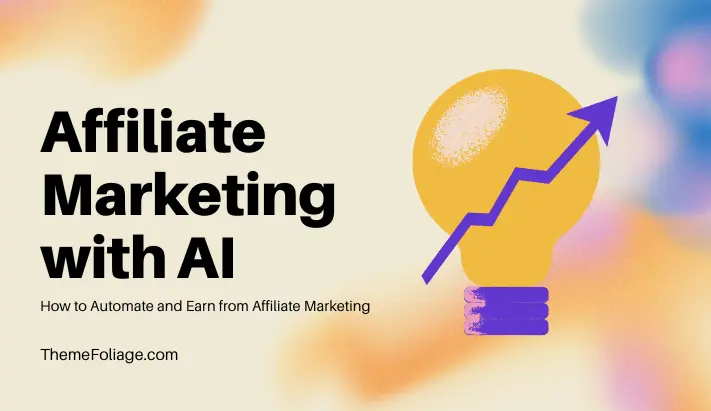In 2025, content is still king, but distribution is the kingdom. Creating high‑quality content is only half the battle; ensuring it reaches diverse audiences across multiple platforms is where the real challenge lies. That’s why AI for content repurposing has become a cornerstone of modern digital marketing.
Instead of producing new content from scratch every time, AI enables marketers to transform a single blog post, podcast, or webinar into dozens of assets, social media snippets, videos, infographics, newsletters, and more. This not only saves time and resources but also maximises the ROI of every piece of content you create.
Why Content Repurposing Matters
Content repurposing is not new, but AI has taken it to the next level. Here’s why it’s essential in 2025:
- Efficiency: Repurposing reduces the need for constant new content creation.
- Reach: Different audiences prefer different formats—some read blogs, others watch videos or scroll Instagram.
- SEO Benefits: Repurposed content creates multiple entry points for search engines, boosting visibility.
- Consistency: AI ensures your brand message stays uniform across platforms.
- Data‑Driven Optimisation: AI analyses performance and suggests which formats work best for each audience segment.
As one industry expert put it, “One piece of content, endless possibilities in different formats—AI makes it happen.”
How AI Enhances Content Repurposing
1. Automated Summarisation
AI can condense long‑form content into shorter formats—executive summaries, LinkedIn posts, or Twitter threads—without losing the core message.
2. Multi‑Format Transformation
AI tools can turn blog posts into videos, podcasts into blog articles, or webinars into infographics. For example, a 2,000‑word guide can be repurposed into:
- A YouTube explainer video
- 5 LinkedIn carousel posts
- 10 Twitter/X snippets
- An infographic for Pinterest
- A newsletter edition
3. Personalisation at Scale
AI analyses audience behaviour and tailors repurposed content for different demographics, regions, or buyer personas.
4. SEO Optimisation
AI ensures repurposed content is keyword‑optimised, includes semantic variations, and aligns with search intent.
5. Real‑Time Adaptation
AI tools monitor performance and adjust repurposed content dynamically—for example, changing headlines or CTAs based on engagement.
Top AI Tools for Content Repurposing in 2025
Here are some of the leading AI platforms helping marketers repurpose content efficiently. (Note: Prices may change depending on provider updates.)
| Tool | Function | Pricing (USD) |
|---|---|---|
| Narrato | Converts blogs into social posts, summaries, newsletters | From $39/month (prices may change) |
| Synthesia | Turns text into AI‑generated videos with avatars | From $30/month (prices may change) |
| Pictory AI | Transforms long‑form text or webinars into short videos | From $19/month (prices may change) |
| Recast Studio | Repurposes podcasts into video snippets and audiograms | From $25/month (prices may change) |
| Lately.ai | Generates social media posts from long‑form content | From $49/month (prices may change) |
| Canva AI | Creates infographics, carousels and visuals from text | Free plan; Pro from $12.99/month (prices may change) |
| Descript | Repurposes video/audio into clips, transcripts, and blogs | From $12/month (prices may change) |
Real‑World Example
A SaaS company published a 3,000‑word whitepaper. Using Narrato and Pictory AI, they repurposed it into:
- A 5‑minute explainer video for YouTube
- 12 LinkedIn posts
- 3 infographics for Pinterest
- A 7‑email nurture sequence
- A podcast episode summary
The result? Traffic increased by 62%, and lead generation grew by 34% within two months—all from one original piece of content.
How to Build Your AI Content Repurposing Workflow
- Start with Evergreen Content: Choose high‑performing, timeless content such as guides, tutorials or case studies.
- Select the Right AI Tools: Use Narrato for text repurposing, Synthesia for video, and Canva AI for visuals.
- Define Target Formats: Decide which platforms you want to target—LinkedIn, Instagram, YouTube, newsletters.
- Automate Distribution: Use scheduling tools like Buffer or Hootsuite (integrated with AI) to push repurposed content across channels.
- Measure and Optimise: Track engagement, CTR and conversions. Let AI analytics suggest which formats to double down on.
Challenges and Considerations
- Quality Control: AI outputs need human editing to ensure accuracy and brand alignment.
- Over‑Automation: Avoid flooding channels with repetitive content. Balance automation with creativity.
- Data Privacy: Ensure compliance when using AI tools that analyse customer data.
- Platform Nuances: Repurposed content must be adapted to each platform’s tone and format.
Future of AI Content Repurposing
Looking ahead, AI will not only repurpose content but also predict which formats will perform best before you even publish.
Imagine creating a blog post and AI instantly generating a distribution plan: “This will work best as a 2‑minute TikTok, a LinkedIn carousel, and a podcast snippet.”
We’ll also see more immersive repurposing, AI transforming blogs into interactive experiences, AR/VR content, or personalised video messages.
Final Thoughts
AI for content repurposing is a game‑changer in 2025. By turning one piece of content into many, you save time, expand reach and maximise ROI.
The smartest marketers will use AI not just to repurpose, but to strategically amplify their best ideas across every channel.
Start small, repurpose one blog into a video and a few social posts. Then scale into full workflows with AI tools. The future of content marketing isn’t about creating more, it’s about making the most of what you already have.



